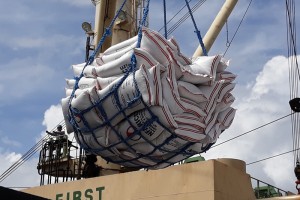
MANILA — With the imminent implementation of the Rice Tariffication Act (RA 11203), a lawmaker at the House of Representatives on Tuesday urged the Department of Finance (DOF) to include in the measure’s implementing rules and regulations (IRR) a provision disclosing all transactions made under the said law, including the identities of all rice importers, among others.
In a statement, Kabayan party-list Rep. Ron Salo said the full disclosure provision would ensure full transparency and help determine rice supply sufficiency and price fairness.
“I call for transparency. Every authorized rice importer, the rice quantities, origin, prices, import duties paid, freight forwarders, and location of all rice warehouses should always be fully disclosed to the public,” the House Deputy Majority Leader said.
“This level of disclosure can be included in the implementing rules and be part of their regular briefings to the media,” Salo said, adding that the DOF and the Department of Agriculture can do this through their official websites and social media accounts.
Salo, one of the members of the Bicameral Conference Committee who finalized the bills that eventually became RA 11203, said the disclosed information can help the public, as well as rice farmers, determine the sufficiency of rice supply, the fairness of selling prices, and compliance with the rice tariffication law.
“It would also assist the Bureau of Customs in determining the correct duties that must be paid,” Salo said.
House Speaker Gloria Macapagal-Arroyo, meanwhile, said she is in favor of calling an oversight committee for the drafting of the law’s IRR.
In an ambush interview, Arroyo said she will ask the chair of the House Committee on Agriculture and Food, ANAC-IP party-list Rep. Jose Panganiban Jr., for his inputs on the matter.
“The chairman is Panganiban and he was the sponsor, so I will ask his ideas. But I think it will be good, because it’s an important bill and now we’ll make sure it’s implemented,” Arroyo said.
“So I suppose the implementation details and what to do will depend on chairman Panganiban,” she added.
The Rice Tariffication Act was signed by President Rodrigo Duterte last February 14.
RA 11203 lifts the quantitative restrictions on rice and allows private traders to import the commodity from countries of their choice.
Rice tariffication is expected to bring down the price of rice by at least PHP7 per kilo.
Under the new law, a 35 percent tariff would be imposed on rice imported from a member country of the Association of Southeast Asian Nations (ASEAN).
A 40-percent duty would be imposed if the rice imported is within the minimum access volume (MAV) of 350,000 metric tons and coming from a non-ASEAN country; and 180 percent if it is above the MAV and coming from a non-ASEAN country.
The DOF announced on Monday that the new regime on rice imports will begin on March 3.
Earlier, Malacañang assured of transparency in the use of the PHP10-billion Rice Competitiveness Enhancement Fund (RCEF).
The fund is mandated under Republic Act 11203 to help farmers affected by rice importation, and at the same time, raise their competitiveness level.
Of the said amount, PHP5 billion will be allotted to farm mechanization, PHP3 billion to the development of seedlings and PHP1 billion for credit assistance to rice farmers.